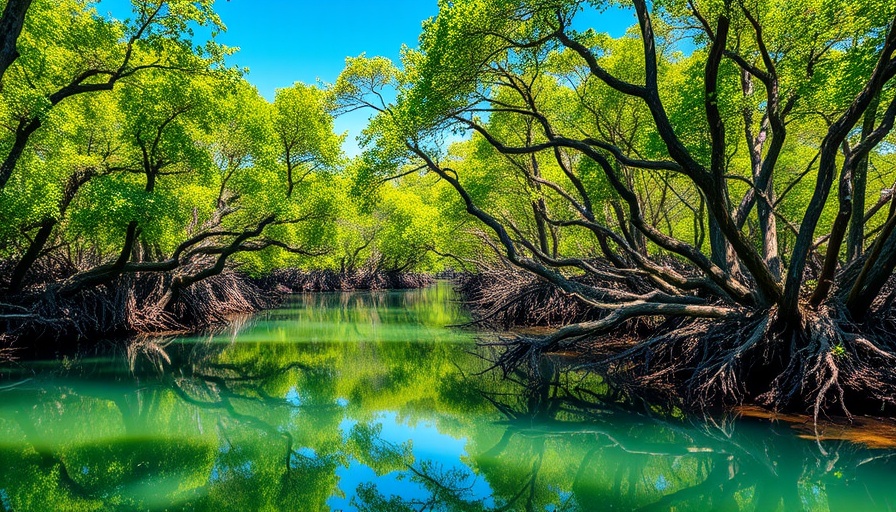
Mangrove Forests: Unsung Heroes of Coastal Resilience
Mangrove forests have long served as nature's shield, protecting coastlines from the destructive forces of storms and acting as valuable carbon sinks. As climate change continues to escalate, concerns have grown about how more extreme weather events impact these vital ecosystems. However, a groundbreaking study from Yale School of the Environment has uncovered that mangrove forests possess surprising resilience in the face of intensified storms, offering hope amidst growing environmental challenges.
Understanding the Significance of Mangrove Forests
Mangroves, which occupy only 0.5% of the coastal area globally, perform extraordinary duties — they sequester an estimated 10% to 15% of total coastal sediment carbon storage and contribute 10% to 11% of total particulate carbon exported to marine environments. Their life-sustaining role isn’t just about storing carbon; it’s integral to the broader dynamics of the global carbon cycle. This has profound implications, especially as industries increasingly seek sustainable practices to mitigate climate impacts.
Post-Storm Recovery: A Positive Outlook
The recent Yale study focused on the 'recovery debt' of mangroves in Everglades National Park post-hurricanes Irma in 2017 and Wilma in 2005, defining recovery debt as the quantity of carbon lost during storms and the period needed to recuperate. Hearteningly, findings revealed that the mangroves managed to restore all lost carbon within four years. This recovery rate suggests that south Florida’s mangroves will continue to function as robust carbon sinks, even as hurricane events intensify.
The Threat of Loss: A Call for Conservation
Despite their resilience, mangrove forests face significant threats. Over 35% of these ecosystems have been degraded or lost in the past twenty years due to human activity. This makes it crucial for boutique hospitality professionals to understand the vital role mangroves occupy and the importance of nature reserves in preserving these ecosystems. The more we engage in climate awareness and advocate for responsible land use, the better we can protect these remarkable woodlands.
Bridging Hospitality and Ecological Practices
For boutique hospitality professionals—who often emphasize sustainable tourism—a commitment to preserving mangrove forests and employing eco-friendly practices can enhance their brand. Integrating local climate awareness initiatives, such as supporting mangrove conservation efforts or offering guests experiences that educate them about the significance of these ecosystems, can also amplify a business's appeal. Engaging guests with the benefits of 'chaos gardening' in their properties, such as creating natural habitats for local wildlife, further builds this connection.
Future Considerations: Adapting to Climate Change
As climate scientists issue warnings about the increasing frequency of severe weather events, proactive measures are essential. Boutique hospitality operators looking to thrive in such conditions must prioritize environmental sustainability. This includes exploring innovative solutions such as leather alternatives for hospitality goods, tackling issues like microplastics in oceans, making strides toward zero-waste initiatives, and utilizing eco-friendly materials that reduce plastic dependency.
A Call to Collective Action
Ultimately, the resilience of mangrove forests should inspire collective action. It's a reminder that while nature has remarkable recovery abilities, human beings hold the responsibilities that come with stewardship. Taking steps to educate ourselves, our teams, and our guests about the ecological benefits and challenges of mangroves can galvanize efforts to preserve them.
For boutique hospitality professionals, this is not just about protecting the environment; it’s about fostering a sustainable future for tourism and ensuring that we maintain the delicate balance of our ecosystems. Let’s embrace the opportunity to make environmental stewardship a core component of our hospitality experience.
Engage in climate awareness and promote sustainable practices—your actions can make a difference!
 Add Row
Add Row  Add
Add 




 Add Row
Add Row  Add
Add 

Write A Comment